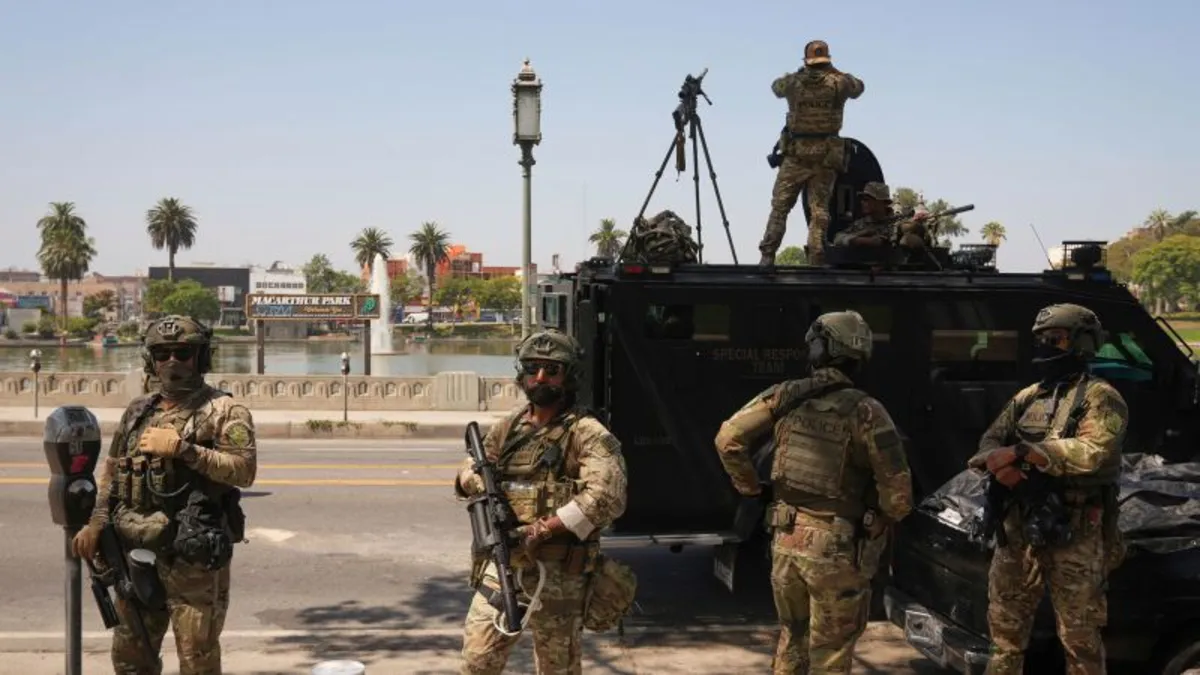
A federal judge has ruled that the Department of Homeland Security (DHS) has been conducting immigration stops and arrests in Los Angeles without probable cause. This landmark decision, issued on Friday, mandates that the DHS cease detaining individuals based solely on race, spoken language, or occupation.
US District Judge Maame Ewusi-Mensah Frimpong, appointed by former President Joe Biden, has instructed the DHS to create comprehensive guidelines for officers to establish “reasonable suspicion.” This guidance must ensure that decisions are not influenced by an individual's race, ethnicity, language, accent, or their presence at locations commonly frequented by undocumented immigrants, such as bus stops or workplaces.
This ruling follows the American Civil Liberties Union (ACLU) of Southern California's lawsuit against the Trump administration, which was brought forth last week on behalf of five individuals and immigration advocacy groups. The lawsuit claims that the DHS, which oversees Immigration and Customs Enforcement (ICE), has been making unconstitutional arrests and obstructing detainees’ access to legal counsel.
In her ruling, Judge Frimpong emphasized the necessity of evaluating whether the plaintiffs could substantiate claims that the Trump administration was executing roving patrols absent reasonable suspicion. “This Court decides—based on all the evidence presented—that they are,” Frimpong stated, criticizing the administration for its failure to disclose the justifications behind the arrests.
The temporary restraining order also extends to the FBI and the Justice Department, both of which were named as defendants in the lawsuit and have played roles in immigration enforcement actions. Frimpong's ruling requires DHS to maintain and provide regular documentation of arrests to the plaintiffs’ legal counsel.
During a hearing prior to the ruling, Judge Frimpong expressed skepticism towards the government’s defense, which claimed that DHS agents rely on intelligence or “trend analysis” rather than racial profiling. Frimpong challenged them to produce evidence justifying their arrests based on actionable intelligence, questioning, “It’s hard for the court to believe you couldn’t find one case with a report of why someone was targeted.”
In a related temporary restraining order, Frimpong also prohibited DHS from denying detainees access to legal counsel, including phone calls and visits, in a facility referenced as “B-18” in court documents. Advocacy groups have raised alarms regarding the treatment of detainees in B-18, citing concerns about inhumane conditions, including a lack of access to beds, showers, and medical facilities.
In response to the ruling, DHS spokesperson Tricia McLaughlin criticized the decision, stating that “a district judge is undermining the will of the American people.” Since assuming office, former President Trump has aggressively pursued measures to tighten immigration controls. Recently, his administration has called for ICE to amplify deportation efforts in Democratic cities and has dispatched thousands of National Guard troops to Los Angeles amidst protests against immigration raids.
California Governor Gavin Newsom, a Democrat, praised the ruling, asserting that “California stands with the law and the Constitution — and I call on the Trump Administration to do the same.” Similarly, Los Angeles Mayor Karen Bass described the ruling as a significant stride towards restoring safety and security while defending the rights of all Angelenos.
Mohammad Tajsar, a senior staff attorney for the ACLU of Southern California, remarked, “No matter the color of their skin, what language they speak, or where they work, everyone is guaranteed constitutional rights to protect them from unlawful stops.” This ruling marks a pivotal moment in the ongoing battle for immigrant rights and due process in the United States.
This story has been updated with additional details and insights from CNN’s Hannah Rabinowitz.